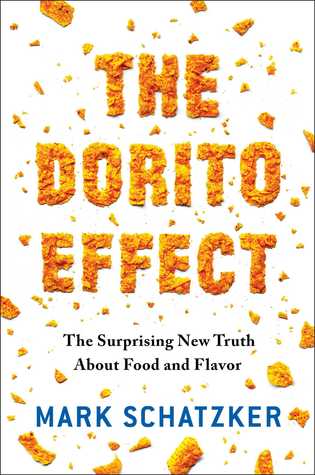The quest for deliciousness is the fuel that powers the behavior, the god that breathes life into the machine. Animals eat what they need because what they need tastes good.What a fascinating book is The Dorito Effect: With equal parts accessible science and entertaining detective tale, author Mark Schatzker attempts to answer the questions, “Why is so much of the human brain devoted to the discernment of flavour, and why, with ever more access to fresh foods and diet schemes are we getting fatter and fatter?” I found the answers to be informative and intriguing.
The science behind flavour was so engrossing: Humans are able to distinguish more than a trillion different aromas in addition to the tongue-sensed flavours of sweet, salty, bitter, sour, umami, and the little-understood kokumi. Obviously, this much evolutionary devotion to taste must mean something important is involved. Like the author, I had long thought that humans were simply programmed to crave calorie-rich foods, like sugar and fats, but it's really not that simple (or else we'd all be drinking pure sugar water and eating the fat instead of the muscle on our steaks). Demonstrating through experiments that animals from wasps to sheep to humans will unconsciously prefer foods that provide micronutrients that they've been deprived of, Schatzker proves that at the cell level, our bodies understand what it is we need to eat and we seek these foods based on the elemental flavours and scant aromas that we can't possibly be conscious of them possessing. Like some pregnant women who eat clay, it's often the weirdest tasting foods that turn out to be the best for us (like super bitter radicchio or olive oil so pure it burns the throat), and unsurprisingly, the benefits of whole foods cannot be reduced to a multivitamin.
So, if our bodies unconsciously know what's good for us, why do we eat all the wrong things? Three breakthroughs occurred in the food industry at the same time in the mid-twentieth century: The mass production of plants and animals (which dilutes the presence of micronutrients, and consequently, flavour); the discovery of artificial flavours in the lab (the addition of which to unnutritious foods – like vitamin water or sugary yogurts – fools our bodies into thinking they're getting what they need, and when the body still feels malnourished, we crave more and more of these highly-flavoured yet nutrient-poor foods); and the enrichment of rice and flour and breakfast cereals in North America (which trains the body to crave carbs when vegetables are a much more efficient and complete source of things like niacin and riboflavin). I love learning about unintended consequences – the irony of so many wonderful breakthroughs that allow us to feed more people while nourishing them less. It was an interesting observation that countries like Italy, France, and Japan – that enjoy both long lives and vibrant food cultures – don't enrich their flour or wheat and have adults that eat a huge range of vegetables.
I remember someone when I was little (maybe a friend's Dad?) telling me that when he was little, he loved to pluck a red tomato off its vine and eat it like an apple. I have never in my life had a tomato that I would eat plain and that's Schatzker's main point: We have bred the flavour out of our foods (which makes us crave foods with artificial flavours, or at least drench our flavourless tomatoes in ranch dressing) and that should be ringing alarm bells because it means that we've also bred out the nutrition. His investigation culminates in a dinner of heritage ingredients – grown slowly from pre-industrialised varieties of chicken, greens, vegetables, fruit and chocolate – which was intensely satisfying for him and the (mostly scientist) guests he had invited. One guest remarked, “If every portion is small and intensely flavored, then the entire meal stays at the place of greatest enjoyment.” Sounds good to me, and if a person could get a meal like that at an affordable price...
And that's the conclusion: There are affordable varieties of full-flavoured and fully-nutritious greens and vegetables available already, but so long as grocery shoppers want quantity for cheap, growers and grocers aren't interested in taking a chance on them; consumers must demand better. I am on board with the conclusion, but even if a barred rock chicken promises to be the most satisfying protein I've ever experienced, am I willing to pay $20 or $30 for one smallish bird at the meat counter?
And, by the by, this book isn't a hippy-dippy anti-industrialisation, pro-organic shamefest. When talking about the human love of herbs and spices (which, as it turns out, we've been using for over 6000 years and have recently discovered to have a range of antioxident, cancer fighting, micronutrient benefits), Schatzker says:
I am not referring to obscure, wincingly bitter herbal remedies from the Amazon sold in stores by people who think fluoride is a conspiracy.The Dorito Effect is absolutely my type of book and I hope it gets wide coverage: This is just too interesting and important to learn and then ignore.

